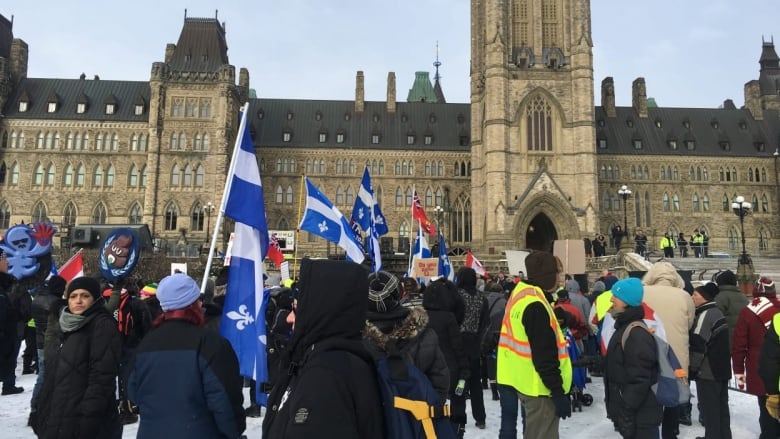9 arrested during protest against UN migration pact on Parliament Hill
Man faces charge of assaulting police officer, 8 others released with trespass notices

Nine people were arrested at an anti-migration protest on Parliament Hill Saturday afternoon.
Protesters from various groups, including Quebec far-right group La Meute, held a rally in front of Centre Block, site of the House of Commons and Peace Tower, to protest against a United Nations international migration pact, which Canada is set to adopt.
Counter-protesters also attended the demonstrations in opposition, and more than 400 people attended the protest and counter-protest.
In an interview in French, Sylvain Brouillette, a spokesperson for La Meute, said about 15 groups helped organize the protest, which was planned to challenge Canada's signing of the migration pact.

The demonstration was relatively peaceful, with an increased police presence.
An Ottawa man was arrested and is facing a charge of assaulting a police officer, after an altercation with an RCMP officer, Ottawa police said.
Eight other people were also arrested and released with trespass notices, said Joseph Law, a spokesperson with the Parliamentary Protective Service.
Migration pact divisive
About 167 countries have agreed to adopt the United Nations' Global Compact for Safe, Orderly and Regular Migration, a document that lays out a collaborative approach to dealing with growing global migration.
The pact sets out 23 objectives for treating migrants humanely and efficiently.
The federal Conservatives have already opposed the signing of the pact, and Leader Andrew Scheer warned it could lead to an erosion of Canada's sovereign authority to make decisions on immigration.
The Trudeau government defended its position, stressing that the pact was not a legally binding treaty.
The text of the agreement establishes a legally non-binding framework for co-operation and reaffirms the sovereign right of states to define their national migration policies and their right to manage migration within their jurisdiction, in accordance with international law.
The UN conference to adopt the pact will be held in Marrakech, Morocco on Monday and Tuesday.
With files from Radio-Canada and Kathleen Harris